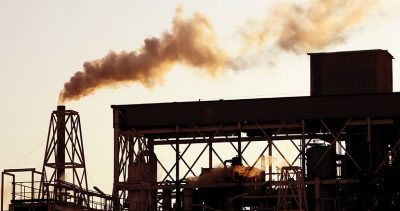Greenhouse Gases Continue Their Massive Rise
Leading powers are grossly shirking their climate responsibilities.

Note to readers: please click the share buttons above
Since 1990 global carbon emissions have increased by over 60%, and continue rising despite the rapidly worsening consequences of climate change. At the 1992 Earth Summit, a UN conference held in Brazil, the usual jargon was heard emanating from first world capitalist leaders.
President George Bush Sr said he desired America to become “the leaders, not the followers” on critical issues like climate change, and that his country will be “pre-eminent” in carrying out the accords signed at the summit. In the years since, the precise opposite has occurred as America’s carbon emissions continued their exponential rise, aided and abetted by successive presidents to Donald Trump. The 1992 Earth Summit in Rio de Janeiro failed abysmally, and America was far from alone in assaulting the earth with increasing ferocity and short-sightedness.
Britain’s then prime minister John Major said the climate conference was “proof of a dramatic shift over the last decade: the environment is no longer the specialist concern of a few – it has become the vital interest of us all”. There has certainly been “a dramatic shift” in the increasing annihilation of the planet, with “the specialist concern of a few” holding much of the blame.
There were 108 government leaders present at this meeting, almost all of whom – despite fancy words and assurances – did nothing in the elapsing time to ensure the planet’s preservation, quite the opposite in some cases. Ian Angus, a Canadian environmental activist and author, writes that,
“there was one exception, one head of state who spoke out strongly in Rio and called for immediate emergency action, and then returned home to support implementation of practical policies for sustainable, low-emission development. That head of state was Fidel Castro… After the 1992 Earth Summit, only the Cubans acted on their promises and commitments”.
Castro himself said during the Rio summit,
“An important biological species – humankind – is at risk of disappearing due to the rapid and progressive elimination of its natural habitat. We are becoming aware of this problem when it is almost too late to prevent it. It must be said that the consumer societies are chiefly responsible for this appalling environmental destruction… They have poisoned the seas and rivers. They have polluted the air. They have weakened and perforated the ozone layer. They have saturated the atmosphere with gases, altering climatic conditions with the catastrophic effects we are already beginning to suffer”.
These words were spoken over 25 years ago.
Castro’s remarks went unreported by Western mainstream outlets, who carefully avoid unloading such unwanted factual comments onto the delicate senses of their readers. One can assume that, because of statements such as these, Castro was routinely derided by the West, while being targeted for assassination across the decades. Any threat to the capitalist, profit-driven world order must be eliminated or, failing that, isolated, assaulted and placed under punishing embargos. An alternative example to capitalism cannot be allowed to spread, as it may result in the gradual decline and fall of the corporate-dominated societies, which are inflicting the vast majority of destruction upon the planet.
Following the conference, Castro led efforts to sustain the environment and safeguard the Caribbean island’s future with its 11 million inhabitants. Cuba quickly modified its constitution in order “to ensure the survival, well-being and security of present and future generations”. In the time since, the Cubans have adopted such policies as low-fertilizer agriculture, the sustained reduction of fossil fuel usage, increasing reforestation efforts with wooded areas now covering over 30% of the country’s landmass, etc.
In 2016, the World Wildlife Fund (WWF) again announced that Cuba was the only country in existence fully meeting its criteria for sustainable development. The WWF reported the same fact regarding Cuba a decade previously. In December 2008, it was revealed that Cuba had reduced its greenhouse gas emissions by almost 3.5 million tons, the graph since continuing along similar lines. Here is ample evidence that the Castro government – again in isolation – was taking a major stand against the most important issue in human history, climate change (along with nuclear weapons). Yet there is barely a word about Cuba’s environmental efforts ever reported in mainstream dialogue, so that it is almost unknown to the present day.
Meanwhile, in the US, after Donald Trump assumed office just over 18 months ago, the mass media have rebuked him on everything from “links to the Russian government”, to alleged involvement in scandals, to attacks from former aides, intelligence chiefs, etc. Such attempts as these to undermine Trump have been disingenuous at best.
Little has been spoken with regard easily the most important topic Trump should be criticized for: His relentless attacks on the environment starting from virtually the first day he entered the White House. On 24 January 2017, the planetary assaults began when Trump issued memoranda aiming to speed up permission for the massive oil pipelines, Dakota Access and Keystone XL. The implementation of pipeline usage, such as in Dakota, began despite fierce opposition from environmental groups and indigenous communities. Across the world, it has been the indigenous peoples in particular who have been trying to hold back the “civilized” ones from their insatiable attacks on the earth.
The following day, 25 January 2017, all reference to the words “climate change” were excised from the White House’s official website. It was an ominous sign of things to come from the Trump administration, ranging from cuts to climate science research, dismantling of crucial EPA legislation, avoidance of bans on lethal pesticides, unrestricted extraction of fossil fuels, and so on.
The reality is that climate change and environmental protection is bad for business, particularly in a capitalist society. The critical element behind Trump’s astonishing attacks on the earth is the institutionalized bid to gain as much profits and wealth as possible. Destruction of the planet is an inevitable byproduct of the corporate-driven model which is prevalent around the world. Unless the capitalist entity is dismantled as a result of dedicated, mass popular activism, and replaced with an ideology in tune with the planet’s requirements, the extermination of ecosystems will continue unchecked.
Another harmful offshoot of capitalism is the mountainous waste it produces, be it chemical, industrial, etc. With regard plastic waste, on current trends, by 2050, the substance will be more numerous than fish in the oceans. Much plastic material provided is used once, thrown away, and will remain in the environment for thousands of years. Yet plastic production by major companies continues to increase. Every 60 seconds, humans purchase around a million plastic bottles. In 2020 it is estimated that over half a trillion plastic bottles will be sold worldwide. Where is all this plastic going to go? Over 90% of plastic is not recycled, so that which is not incinerated will be cast into the environment like worthless confetti, as so much before it.
While the US merits much criticism for its environmental policies, China is over the horizon as the world’s biggest greenhouse gas emitter. China produces about twice as much carbon emissions as America, with the Asian superpower creating more than a quarter of all human-engineered greenhouse gases. Far from slowing down, China’s fossil fuel emissions are growing, and are set to reach a seven-year high as the nation’s “economy booms”. The world’s biggest importer of oil and burner of coal, China is the leading state people are looking towards in somehow rescuing the world from disaster, following Trump’s ejection of America from the Paris Climate Agreement last summer.
Just days before Trump took office, Chinese president Xi Jinping said,
“China will continue to take steps to tackle climate change and fully honor its obligations”.
In May 2017, Xi Jinping again assured the world that China “should protect the achievements of global governance, including the Paris agreement”. Over a year later, something close to the opposite is occurring as China’s already dire environmental record worsens. As 2018 advances, the Chinese consumption of coal, gas and oil is rising, a trend that will likely continue. China has much of the world’s future in its hands, but there is little sign the country is stepping up to the unprecedented tasks.
Russia, the planet’s third major power, also has a far from impressive environmental record. Extensive climate reports outline that, “Not only is Russia predisposed geographically to the impacts of climate change, but it also a major emitter of greenhouse gases and a global supplier of fossil fuels”, with its emissions “now resuming their upward trajectory”. Indeed, Russia is the fourth largest greenhouse gas emitter in the world.
In regard fossil fuels Russia is the biggest oil producer on earth, with the country also being the second biggest exporter of oil (behind Saudi Arabia), and is by far the greatest supplier of oil to Europe. Russia is the largest gas exporter on the planet, last year supplying almost 40% of Europe’s gas, a record level. Russia also possesses by far the largest known gas reserves and has designs to extract further gas, and oil, from the resource-rich Caspian Sea. In addition, Russia has the second biggest coal reserves in the world (behind the US), and is the sixth biggest producer of coal.
Almost two-thirds of Russia’s gigantic landmass is underlain by methane-laden permafrost, which if melted will accelerate the heating of the globe. Some of this permafrost is already disappearing forever. Last month, temperatures of over 90 degrees Fahrenheit (33 Celsius) were recorded in northern Siberia, more than twice the average and a forecast that amazed meteorologists. Climate change has been gripping Russia, as extreme weather events in the country have doubled over the past generation, with signs it is deteriorating further.
To compound Russia’s climate situation, the nation is losing about 16 million hectares of forest each year to illegal logging, wild fires and pollution. Much of this unsustainable deforestation is occurring in Russia’s far east, which threatens the country’s magnificent Siberian tiger – already endangered, but clinging on, and one of the few iconic animals remaining on earth. This lost woodland would also have served as a sponge to absorb some of Russia’s carbon emissions.
*
Shane Quinn obtained an honors journalism degree. He is interested in writing primarily on foreign affairs, having been inspired by authors like Noam Chomsky. He is a frequent contributor to Global Research.
 Can you help us keep up the work we do? Namely, bring you the important news overlooked or censored by the mainstream media and fight the corporate and government propaganda, the purpose of which is, more than ever, to “fabricate consent” and advocate war for profit.
Can you help us keep up the work we do? Namely, bring you the important news overlooked or censored by the mainstream media and fight the corporate and government propaganda, the purpose of which is, more than ever, to “fabricate consent” and advocate war for profit.
We thank all the readers who have contributed to our work by making donations or becoming members.
If you have the means to make a small or substantial donation to contribute to our fight for truth, peace and justice around the world, your gesture would be much appreciated.

